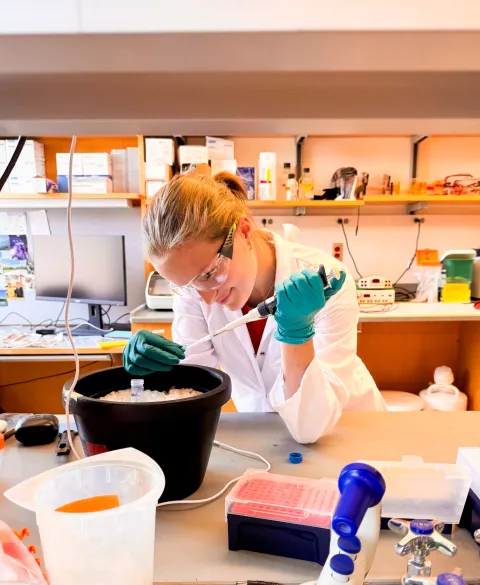
Somer Loto, from Northwood, NH, is a B.S. biomedical science: medical microbiology major and a minor in genetics. Somer shared her experience working in Vicki Jeffers' lab researching the parasite Toxoplasma gondii.
Please describe the research/work conducted in the lab.
Somer Loto: Our goal is to understand more about how Toxoplasma gondii regulates its genes so we can find proteins necessary for its replication and survival. We do this through many methods such as inducible knockdown assays to remove specific genes or proteins, immunofluorescent assays to observe any phenotypical changes to the parasite, and many other methods to better understand what protein complexes are necessary for parasite survival.
Why is this work important?
Somer: This work is important because T. gondii is a highly prevalent parasite, infecting around one third of the worlds population, and at the moment, there is no cure. While T. gondii can live in humans chronically, causing minimal to no side effects in immunocompetent patients, the moment an individual becomes immunocompromised, the once dormant parasite can quickly turn into an opportunistic pathogen and cause a myriad of problems. Through the research in this lab, we are working on discovering parasite specific drug targets to provide the steps necessary to make accessible and effective treatment for those affected.
What is your role and what are your responsibilities?
Somer: I have a couple roles in this lab. Originally, I was an apprentice, helping my mentor Olivia Beauchamp with her research on the three TATA-Binding Proteins (TBPs) and their effect on parasite replication and survival. In this role, I would help with some bench work but my main goal was to work with the fluorescence microscope to observe any phenotypical changes in T. gondii when TBPI was knocked out. We are hoping to move forward with the same work for TBPII soon. Recently, I was given my own project concerning the TBPs. My job in this role is to find the function of a part of each of the proteins that was previously thought to be non-functional. Through this research we can determine if this could be a parasite-specific way to knockdown the vital TBPs in T. gondii.
What do you enjoy most about your work?
Somer: I enjoy so many things about my work in this lab but if I were to have a top three it would be the unpredictability, my co-workers, and the way I feel like my work in this lab could lead to a result down the road that could help hundreds of thousands of people. One of my goals in life has always been to help people, to try and make a life better, whether that be for a small portion of people, or in this case possibly one third of the world population. I also love that no day working in the lab is the same as one another. Results are unpredictable, they can take you down the exact path you were hoping for or they show you something you hadn't even considered. Working in the lab always keeps me on my toes and teaches me not be disappointed if something doesn't go the way I had hoped, and instead look at it as an opportunity to think outside the box or learn something new.